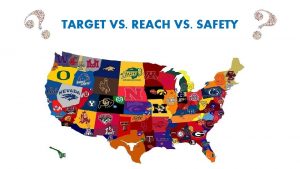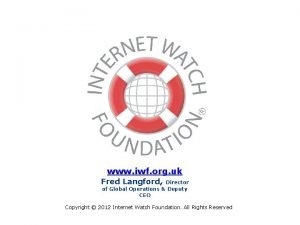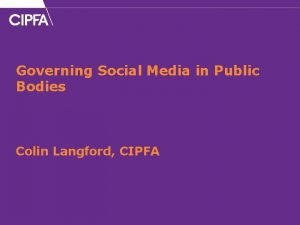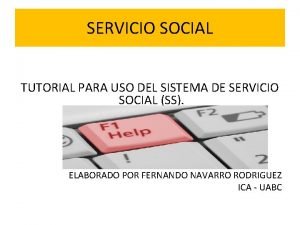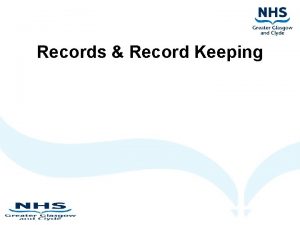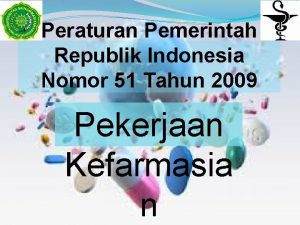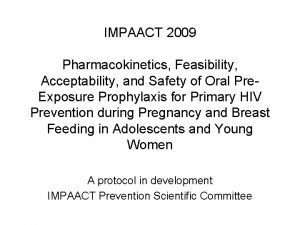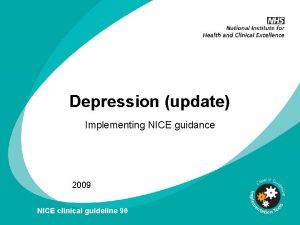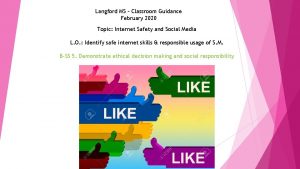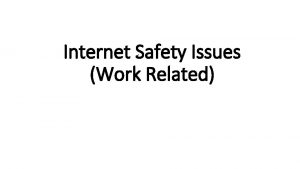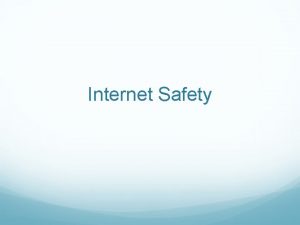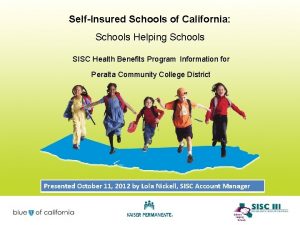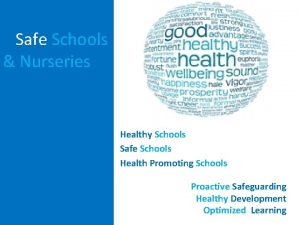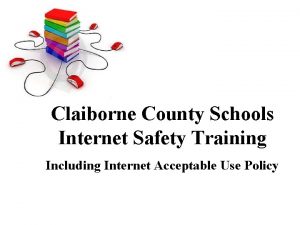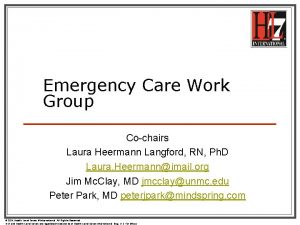Internet Safety Langford Schools Fall 2009 Internet Safety


























- Slides: 26

Internet Safety Langford Schools Fall, 2009

Internet Safety

Internet Safety • The World Wide Web (www) is an information storage system of web sites. • • People, businesses and organizations post information about themselves online. • • They may feature pictures, sounds and movies.

Internet Safety • No one owns the internet and no company or government controls it. The internet runs itself. • • • Because of this, people must be very careful when providing personal information or communicating with others.

Internet Safety • • • • What if You were online and: A message popped up that said you might be a winner but first you need to supply some personal information? You were in a chat room and someone you were talking with asked you for your name, age and address? You found something you wanted to buy? Someone in a chatroom you’ve been talking to wants to meet you in person? You are having a tough time choosing a screen name?

Internet Safety • Someone you do not know sends you a picture or something to download? • • You downloaded something that made your computer do strange things?

Internet Safety • User Profile • • Information you supply when you start your online service or that the computer keeps track of to identify you as a “user”. • • The computer keeps track of: • Your correspondence • The web site you visit • The pages you view and how long • What you’ve bought, downloaded or printed • • If you fill out a personal profile that other kids can read online, don’t say too much. Strangers can see it too!

Internet Safety • Take a Time Out • • Using a computer may seem addicting. Be sure to take time for yourself and get all your other activities completed. • Make time for: • Homework • Family and friends • Sports and outdoor activities • Your hobbies and things you enjoy doing • Church and Community events • Volunteer Work • Organizing your learning skills • • Don’t forget to blink! Take a 15 minute break every hour you’re on the computer.

Internet Safety • • Did You Know? There is a lot of information on the Internet, but you shouldn’t believe everything you see and hear.

Internet Safety • • • Why did the computer go to the hospital? It had a key stroke.

Internet Safety • • • E-mail Electronic mail is sending a letter anywhere in the world using a computer and an e-mail address. Most people who use e-mail and the Internet are using it for a good purpose to communicate with friends and family. However be careful. . . Only give your e-mail address to trusted friends and family members. If you share a computer, use a password on your e-mail account to keep others from reading your e-mail. Only share your password with your parents. Only open e-mail and attachments from people you know. If you are unsure of an e-mail, ask your parents. Ask for permission before you download any online games. Be careful of hidden costs. Remember, your e-mail can easily be copied, printed, or forwarded to others without your persmission. Never gossip or send an e-mail that can be hurtful or misleading. Always write the topic of your message in the subject block.

Internet Safety • Spam • • Some people use the computer to trick others and cause problems. Spam is “junk” e-mail, usually an advertisement, trying to get you to visit a web site or to buy something. • • Be sure to ……………… • Only respond to e-mail from addresses you know or emails you are expecting. • Read the subject line before opening any e-mail. If it sounds misleading or like a prize, don’t open it. Normally, if it sounds too good to be true it usually is.

Internet Safety • • • Viruses Just as you are subject to colds and viruses, so are computers. A computer virus is a program that causes severe problems with your computer and may spread to others you contact online. People who get caught sending computer viruses may go to jail. A computer virus can be sent from a stranger pretending to be you or someone you know. Use filtering software to block out junk e-mail (spam) and viruses. You can use more than one at a time. NEVER fill out questionnaires, surveys, or forms, enter contests, or register for clubs to enter sites or to play games online. When someone offers you something for free such as a product upgrade, gifts, money, or prizes, it may just be a way to get personal information from you.

Internet Safety • Cookies • • Any site you visit can send programs called “cookies” down the phone line into your computer. This is for accessing your personal information to try to sell you something, or to sell your “profile” to another marketing group. • • Beware of fraud. Companies will pay big money to get your personal information.

Internet Safety • Chat Rooms • • These are sites on the Internet where “friends” can meet to talk about specific issues. Unlike e-mail, chatrooms are in “real time” which is like typing a telephone conversation. You see someone respond to you right away without a pause. • • Be careful. Not everyone in your room maybe your friend. Dangerous people may pretend to be your friends and may even talk you into going into a private chat room.

Internet Safety Instant Messaging Instant messaging or IMing is when users have real-time conversations in a text window online. This conversation is not always friendly. Some use it to air anger or hurt feelings. They aren’t necessarily trying to be mean, it’s just often easier to say something online than in person. • • • Use common sense when IMing. Respect time limits. Use good netiquette (computer manners). If anyone says anything online that makes you feel uncomfortable, report it to your parents or teacher right away. • •

Internet Safety • • • • Protect Yourself Just like in “real” life, on the Internet the more information someone has about you, the more likely they can use it to find out things you don’t want to share. An example would be to tell someone where you live. Dangerous people can get that information and follow you home or worse. NEVER give anyone the following information about yourself: Boy Girl Grade Age Name Race Nickname Address Phone number City/town

Internet Safety • • • • • Neighborhood State School name School location Local hangout Schedule Sports you’re in Practice field Parents name Parent’s work Pet’s name Friend’ name Allowance Credit card numbers e-mail address password photographs

Internet Safety • Remember to use an unusual password. The name and passwords that are easy for you to remember are also easiest for others to figure out.

Internet Safety • BEWARE & Be Aware • • Be leery of people who ask you personal questions. Do not answer them. • • Never tell anyone at the door, on the phone, or on the Internet that you are home alone or when you will be home alone. • • Never post pictures of yourself on the Internet. • • Only download pictures, games, and information that your parents say are okay. • • Never arrange a face-to-face meeting alone with anyone you’ve met on the Internet.

Internet Safety • • • Know What To Do! If someone is being a pest ……………. . Ignore them. Hit the “back” key. Go to another site Sign off – shut down your computer.

Internet Safety • • • Shopping Online The internet is a convenient way to shop at home. The things you buy are mailed to you. However, shop safely. Always ask permission before shopping. Only shop on secure sites which scramble your personal information so it cannot be accessed. Never give out your credit card numbers without your parents’ permission. YOU MUST BE 18 TO MAKE ONLINE PURCHASES. REMEMBER: The internet is not private. Anything you say over the Internet can be altered or read by others. Once you log on to the Internet, you are not alone! Nothing on the Internet is private unless it says it is a secured site.

Internet Safety • • • • Pop – Up Windows YOU MAY ALREADY BE A WINNER! Click Here to Find Out More! A window may suddenly appear, wanting your personal information asking you to complete a survey, or simply wanting you to visit a specific site. NEVER give your personal information over the Internet. CLICK on the box to close it right away. If you go to the site, it may place a cookie in your file and you will get more offers.

Internet Safety • Protect Yourself • • Use a gender-neutral “chat handle” (screen name) that does not describe you in any way. Never use your e-mail address. It’s easy to trace. • Never say anything online that you wouldn’t say in public. When you post a message, your e-mail address is exposed to everyone and anyone can read it. • Never reveal too much about yourself. Be leery of anyone asking personal information directly or indirectly. • Trust your instincts. If someone makes you feel uncomfortable or if something seems wrong, it probably is. Stopping chatting immediately. • Beware of people who show anger or inconsistent and unusual behavior. • Do to respond to inappropriate messages. Forward them to your ISP. • Change your chat name(sign in).

Internet Safety • Use good netiquette(computer manners). It sets the tone of the relationship. • If you decide to meet, choose a safe, public location. Take an adult with you. • Never assume others are telling you the truth just because you are. Half of the people in chat rooms aren’t who they say they are. • • CHAT ROOMS ARE NOT PRIVATE.

Acknowledgements • National Child Safety Council; 2009
 Safety reach and target schools
Safety reach and target schools Fred langford
Fred langford Dr peter langford
Dr peter langford Clinical labs langford
Clinical labs langford Susan langford
Susan langford Ken langford
Ken langford Colin langford
Colin langford Huntsville powerschool
Huntsville powerschool Internet or internet
Internet or internet 2008-2009 school year
2008-2009 school year Virginia kindergarten standards
Virginia kindergarten standards Sistema integral de servicio social
Sistema integral de servicio social Saresp 2009 uma maquina fotografica
Saresp 2009 uma maquina fotografica Nmc record keeping guidance 2009
Nmc record keeping guidance 2009 Cmo 39-2008
Cmo 39-2008 Plan nacional del buen vivir 2009 al 2013
Plan nacional del buen vivir 2009 al 2013 Permenkes no 51 tahun 2009
Permenkes no 51 tahun 2009 R.t.t. 2009
R.t.t. 2009 January 2012 chemistry regents answers
January 2012 chemistry regents answers Calendar april 2009
Calendar april 2009 Rcfce
Rcfce Impaact 2009
Impaact 2009 In 2009 there were 1570 bears
In 2009 there were 1570 bears Rosa catania 2009
Rosa catania 2009 Calendario escolar 2009 a 2010 sep
Calendario escolar 2009 a 2010 sep Nice 2009
Nice 2009 Decreto 1290 de 2009
Decreto 1290 de 2009
